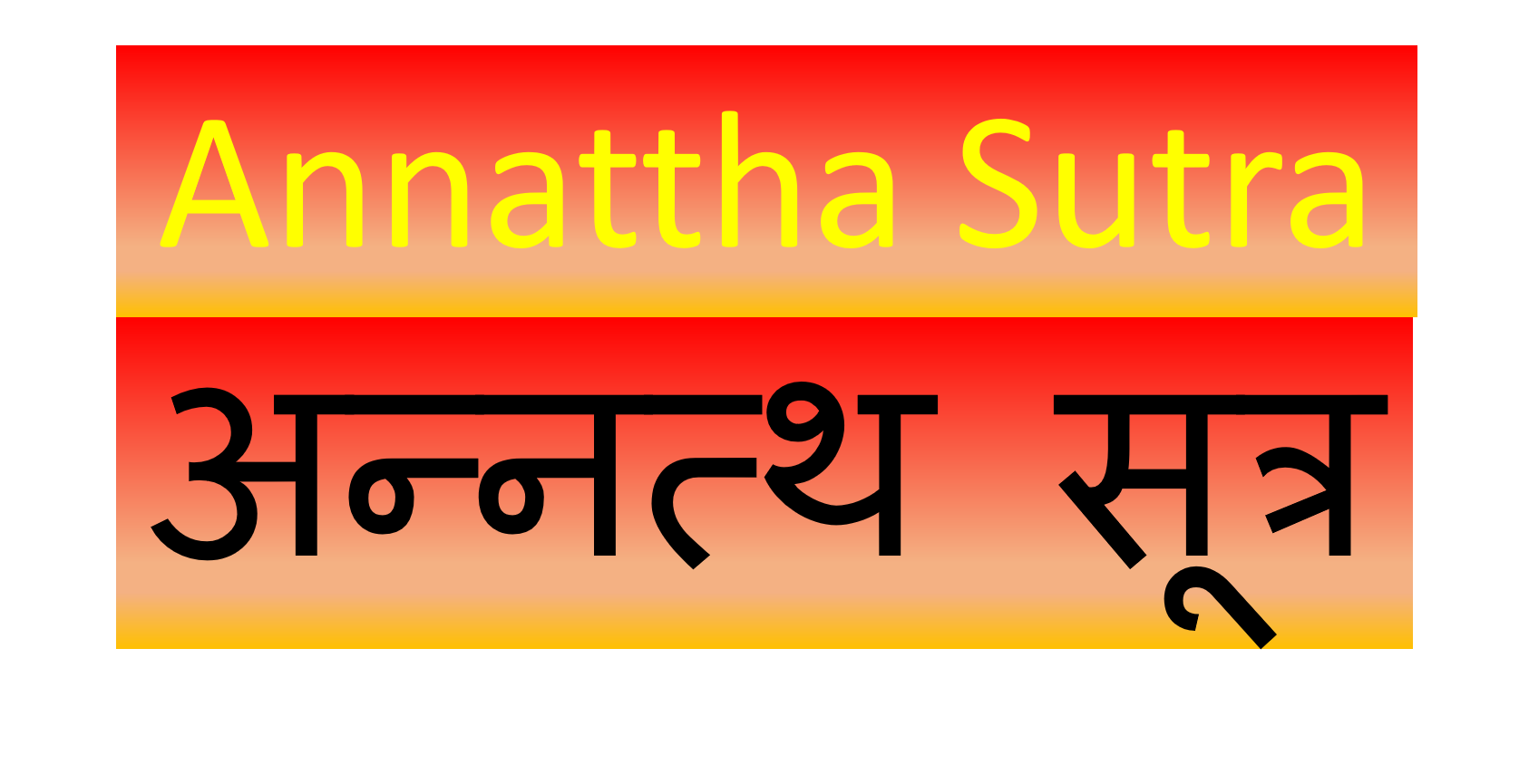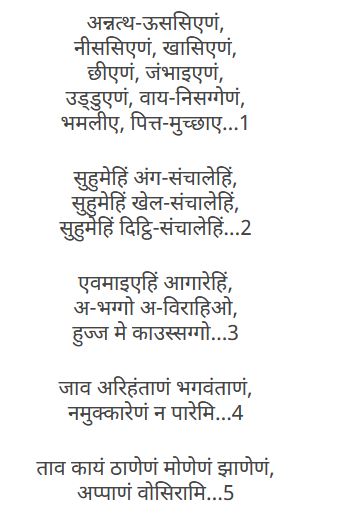Annattha Sutra
There are six essential duties called Āvaśyaka (आवश्यक) which need to performed daily by the Jain laity of which Kāyotsarga (कायोत्सर्ग) is one of them. It means Utsarga (उत्सर्ग, “abandonment”) of Kāya (काय, “body”). It involves deep meditation either in standing, sitting or sleeping position whereby one contemplates on the separation of body and soul and focuses on one’s true spiritual self which is totally separate and distinct from the body.
Kāyotsarga is generally time dependent. Therefore one observes that during Pratikramana, Caityavandan or Samayik people recite certain number of Navkar or Logassa in the Kāyotsarga posture before ending it by giving obeisance of the Arihant Bhagwants. This sutra describes 16 exceptions for the Kāyotsarga not to be considered broken or violated before its completion (by reciting Namo Arihantānam as that is giving obeisance to the Arihant Bhagwants). It lists the 12 exeptions due to involuntary bodily functions and includes 4 other exceptions due to exogenous factors (fire, criminals or terrorists, wild animals, decree by king or state) that may pose a serious threat to one’s life.
It is important to bear in mind that whilst performing Kāyotsarga (कायोत्सर्ग) one should refrain the following defects or violations (although some do not pertain to lay woman and to Sadhvis).
(i) to bend the legs like a horse
(ii) to swing the body like a creeper moving with the wind
(iii) to stand taking the support of a pillar
(iv) to lean the head upon a wall
(v) to stand keeping both legs joined together instead of keeping them apart
(vi) to stand keeping the legs wide apart
(vii) to keep the hands on one’s private organs
(viii) to hold the carvalā or rajoharan like the bridle of a horse
(ix) to keep the face down like a bride
(x) to wear a long cloth (particular for the males
whose attire extends from below to navel to just above the knees)
(xi) to keep the chest covered like a lady due to bashfulness or fear of insect bites (for males)
(xii) to sit covering the entire body like a nun due to fear of mosquitoes or cold
(xiii) to count such as number of recitations using the finger tips
(xiv) to move the eye-balls like a crow
(xv) to fold or contract the clothes due to fear of getting dirty or stinky due to perspiration
(xvi) to oscillate the head
(xvii) to hum like a dumb person
(xviii) to murmur like a drunkard
(xix) to glance around and move lips like a monkey
Thus, the Kāyotsarga (कायोत्सर्ग) has four aspects:
(i) Pratijñā (प्रतिज्ञा): affirmation / solemn declaration that one will abandon their body
(ii) Svarūpa (स्वरूप): form i.e. by being firm in one location, by being silent and by meditation
(iii) Samaya (समय): time dependent i.e. until such time I do not complete the Kāyotsarga (कायोत्सर्ग) by reciting Namo Arihantānam
(iv) Āgāra (आगार): taking into account the exceptions listed
should be done by contemplating on abandoning the body being in one place, by being silent and in deep meditation


Annattha Usasieṇam, Neesasieṇam, Khāsieṇam, Chieṇam, Jambhāieṇam, Uddueṇam, Vāya-Nissaggeṇam, Bhamalie, Pitta-Mucchāe …1
Apart from inhaling, exhaling, coughing, sneezing, yawning, belching, farting, giddiness, fainting
Suhumehim Aṅga-Sañcālehim, Suhumehim Khela-Sañcālehim, Suhumehim Ditthi-Sañcālehim …2
and subtle movements of body, phlegm /air in the body, movement of eyes
Evamāiehim Āgārehim, Abhaggo Avirāhio, Hujja Me Kāussaggo …3
including other exceptions (fire, life threatening situation, threat of wild animals, fear of criminals or rulers), may my Kāyotsarga (कायोत्सर्ग) be unbroken and continuous
Jāva Arihantāṇam Bhagavantāṇam Namukkāreṇam Na Pāremi
as long as I do not complete my obeisance to the Arihants Bhagavants
Tāva Kāyam Thāṇeṇam Moṇeṇam Jhāṇeṇam Appāṇam Vosirāmi
till then I am relinquishing my body by being steady in one place, maintaining silence & in meditation
Click here to download the Annattha Sutra word to word meaning in English
References:
1. Prabodh Tika by Param Pujya Panyas BhadrankarVijayji Maharaj & Param Pujya Munishree Kalyanprabhavijayji Maharaj
2. Pratikramana Sutra With Explanation (Part 1) by Muni Nirvana Sagar
3. Internet
I apologise and seek pardon for any unintentional errors in translation of the verses.